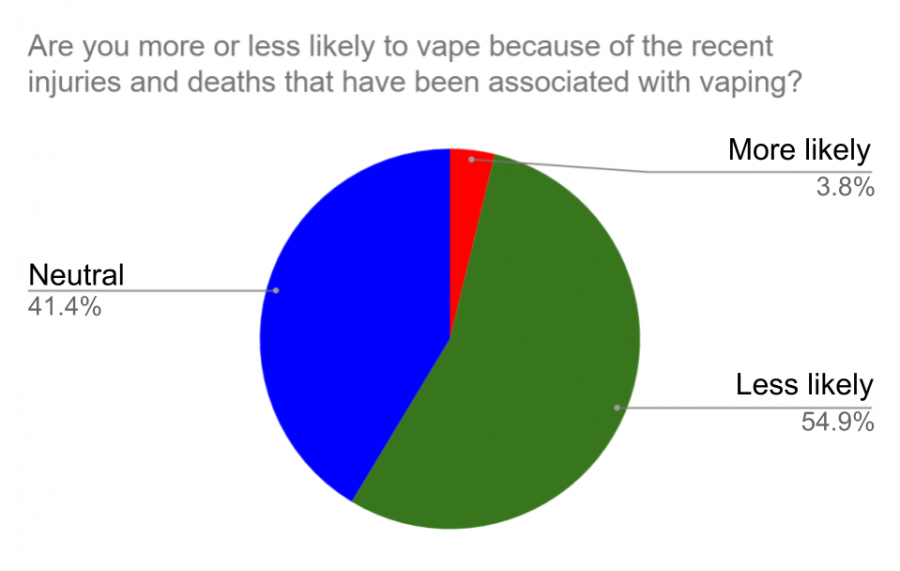Government Reports of Vaping Deaths Causes Change in Student Usage and Opinion of Vapes
March 12, 2020
Student usage and opinion regarding vaping has shifted from two years ago due to federal government investigation and research.
Last year, reports of e-cigarette, or vaping, product use associated lung injury (EVALI) from the CDC prompted government investigation and national press coverage, bringing attention to the rise in student vaping and the dangers of e-cigarettes.
As of February 4th, 2,758 cases of EVALI have been reported to the CDC, with sixty-four confirmed deaths. 15% of the confirmed cases were under eighteen.
According to an anonymous survey of 135 students conducted by the Sword and Shield, 71% say that because of the recent deaths and injuries associated with vapes, they are less likely to vape.
As a result of the reports of these vaping-related injuries, some students, such as junior Kimia Javaherneshan, are concerned for their peers who continue to vape.
“I’m less likely to vape because I know people with nicotine addiction and I see how much it takes over their lives,” Javaherneshan said. “I’m so concerned for all of my friends who suffer from this issue and especially because of all of the injuries and deaths I’m even more worried.”
The survey also asked students to rate the severity of the drug use and vaping issue on campus on a scale of 1-5, with one being not a problem and five being a severe problem. 66.7% of students from this year’s survey, compared with 74.2% of respondents from the 2018 survey, rated the issue of vaping a 3 or higher.
On the other hand, 73% of students have seen other students using e-cigarettes on campus, an increase from 2018, where 66% of students had seen others experimenting with any kind of drug on campus.
“I notice vaping in the girls’ bathroom pretty frequently,” senior Ilana Cohen said. “I’d first smell a strong chemical odor and then see multiple people crowded into the larger stalls.”
Federal and California state law prohibits the sale or use of any tobacco products, which include products that contain nicotine such as some electronic cigarettes, to persons under 21 years of age. However, minors are allowed to possess nicotine-free vaporizing devices.
In addition to these federal and state laws, over sixty California cities and counties have already implemented restrictions on the sale and use of flavored e-cigarettes in response to the increases in EVALI cases and incidences of student vaping nationwide, with San Francisco having already implemented a full ban on the sale of e-cigarettes (February 6th).
Following this trend, Irvine City Council has also recently acted to reduce youth vaping by drafting an ordinance that gives the Irvine Police Department the ability to confiscate flavored tobacco products from minors.
“The negative impacts as reported in 1,888 cases of electronic nicotine delivery systems related-lung illnesses and deaths could also be experienced in the City if flavored tobacco products … were allowed to continue without proper regulations in place”, the ordinance stated. “It is necessary to adopt regulations of the use of flavored tobacco products to protect the public against potential negative health, safely [sic], and welfare impacts.”
Previously, Irvine law only prohibited the sale of flavored tobacco products; however, with this ordinance, the use of flavored tobacco products by minors is prohibited, and thus can be enforced through confiscation.
For first time offenders, the ordinance has also created an option for the offender to participate in a City-approved educational tobacco diversion program, which upon completion will dismiss the infraction.
Council Member Farrah Khan, who along with Mayor Pro Tempore Anthony Kuo requested that Irvine City Council draft the ordinance, said that part of this ordinance was to help kids make the right choices.
“We really want to use this as a way to educate our youth about the dangers of vaping and we hope that we can get them to make the right decisions,” Khan said.
The ordinance does not give the IPD power to confiscate flavored tobacco products from minors on school grounds because minors at school are under the administration’s jurisdiction. However, consequences for vaping at UHS include a rehabilitation program similar to that the ordinance proposes, the IUSD Tobacco Cessation Program.
“For your first offense we get you in a tobacco awareness program which is once a month, one day a week, four hours total,” Vice Principal Mr. Kris Kough said. “Our consequences appear to be parallel.”
Other consequences, according to the Trojan Code of Conduct, include parent contact, a mark on the student’s permanent record, referral to the IPD, and a 3-day suspension for subsequent offenses.
Some students agree with the ordinance, such as junior Zaman Merchant
“I agree on there being [an option of taking] a remediation course because it’s going to give people a second chance to rethink their actions,” Merchant said.
This ordinance was drafted on January 28th, and will be voted on for a second time on an unspecified date.
The vaping epidemic and EVALI cases have also prompted rapid responses from the federal government.
On December 20th, the government passed a law prohibiting the sale of tobacco and e-cigarettes to anyone under 21 in order to curb e-cigarette use, and on February 6th, a nationwide ban on flavored e-cigarette products took effect, with all cartridge and pod flavors being banned except for menthol and tobacco.








